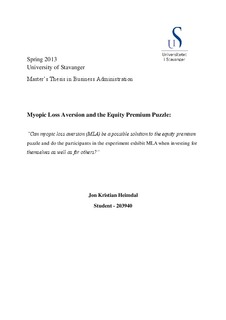Myopic loss aversion and the equity premium puzzle
Abstract
Two concepts from behavioural economics, loss aversion and mental accounting, have been combined to give a theoretical explanation of the equity premium puzzle. Most of the recent experimental results support the theory, as the behaviour of both students as well as professionals has been found to be consistent with myopic loss aversion (MLA).
However, the main focus has been on investing for oneself and scarcely on investing on behalf of others. Many decisions, for example choices by fund managers affect not only their own potential performance pay but also clients returns. The outcome of these choices can again influence both future decisions by the fund manager and the amount that clients are willing to invest, and therefore influence the size of the equity premium.
To investigate this further I ran an experiment with the aim of testing prior findings of MLA in investing for oneself, and more importantly on testing whether behaviour on behalf of others is similar. In order to test this I combined both investing for oneself and others in the same experiment using a within-design, and as far as the author is aware of, this has never been done before. Results show no MLA findings in investments on behalf of others, suggesting that participants are not influenced by the frequency of feedback when investing for others.
Description
Master's thesis in Finance
